29th UN Climate COP Kicks Off
Air Date: Week of November 15, 2024
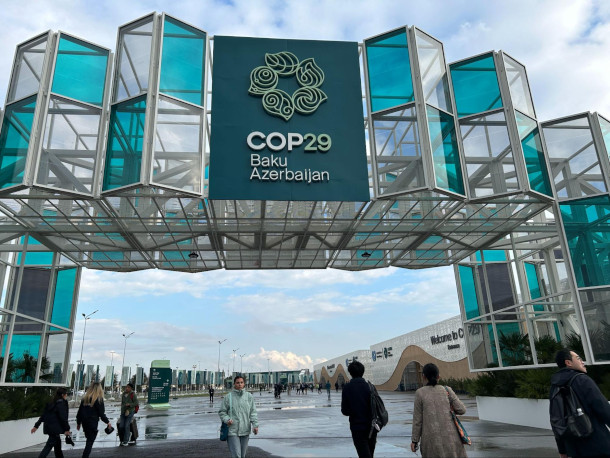
In Baku, Azerbaijan, delegates from nearly 200 countries gather for the UN Framework Convention of Climate Change’s 29th Conference of the Parties, or COP29. (Photo: IRENA, Flickr, CC BY-NC-ND 2.0)
Delegates from nearly 200 countries are meeting in Baku, Azerbaijan for the UN Framework Convention on Climate Change’s 29th Conference of the Parties. Alden Meyer of the climate think tank E3G is a longtime observer of these meetings, and he joins Host Paloma Beltran to share his first impressions as these talks kick off.
Transcript
O’NEILL: From PRX and the Jennifer and Ted Stanley Studios at the University of Massachusetts, Boston, this is Living on Earth. I’m Aynsley O’Neill.
BELTRAN: And I’m Paloma Beltran.
In Baku, Azerbaijan, delegates from nearly 200 countries have gathered for the UN Framework Convention on Climate Change Summit, also known as 29th Conference of the Parties, or COP29. The host country itself is a petrostate where oil and gas production yields more than 90% of its export revenues and nearly half of its GDP.
And notably absent from the climate talks are top leaders from high polluting countries like the US, Brazil, China, and India. Meanwhile the climate crisis is intensifying, and time is running out to meet the goals set by the twenty-fifteen Paris Climate Agreement. Alden Meyer of the climate think tank E3G is a longtime observer of these meetings, and he joins us now from Baku to share what he’s hearing. Welcome back to Living on Earth, Alden!
MEYER: Good to be with you again, Paloma.
BELTRAN: So, what's the mood like at the opening of COP29 in Azerbaijan?
MEYER: Well, it's a little tense, because they have a big decision to make at the end of next week, which is how to set a new finance goal to replace the 100 billion dollars that's been in place for the last five years that was pledged by the US, Europe and other developed countries back in 2009 in Copenhagen. And of course, the need is much greater than that, and developing countries are insisting that developed countries come up with much greater sums of money on the table. And of course, the election last week of Donald Trump in the US has raised questions about whether the US can even participate in that at all, and if so, what does that mean for Europe and others.
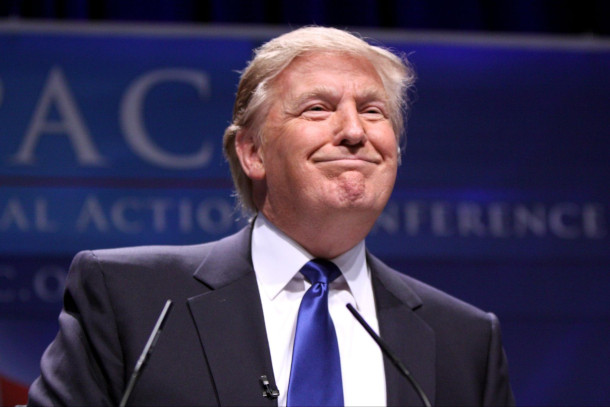
The incoming Trump administration has cast doubt on the United States’ ability to participate in international climate negotiations. US delegates insist they will keep fighting. (Photo: Gage Skidmore, Flickr, NC BY-SA 2.0)
BELTRAN: Yeah, so, let's talk about the US. How are US delegates at COP29 addressing the recent election and for that matter, how are the other nations reacting to a second Trump presidency?
MEYER: Well obviously the US delegation here is continuing to pursue their negotiating brief, their mandate. John Podesta is here as the senior member of the delegation. He did a press briefing yesterday where he insisted that they would continue to fight for what they've been pushing for over the last four years in these negotiations. He also tried to reassure the world that actions by states, cities, businesses and others would fill some of the vacuum created by what President-elect Trump is likely to do once he takes office to the federal program that they've been building. He also talked about how there's Republican support for elements of the Inflation Reduction Act, particularly the tax incentives for companies to invest in clean technologies. But people here are quite nervous about that. They understand that President Trump is likely to pull out of the Paris Agreement on day one, not to take six months like he did last time. They're also quite concerned about what he will do back at home, and what that means for the US ability to pull our share when it comes to emissions reduction, and particularly they're very aware that the last time he was in office, he tried to virtually eliminate US financial assistance for developing countries to decarbonize their economies and to deal with the mounting impacts of climate change. Of course, the last time the Congress, including the Republican Senate, kept him from getting everything he wanted, and they preserved a fair amount of that finance. There's concerns that might not be the case this time around, and what does that mean for the future?
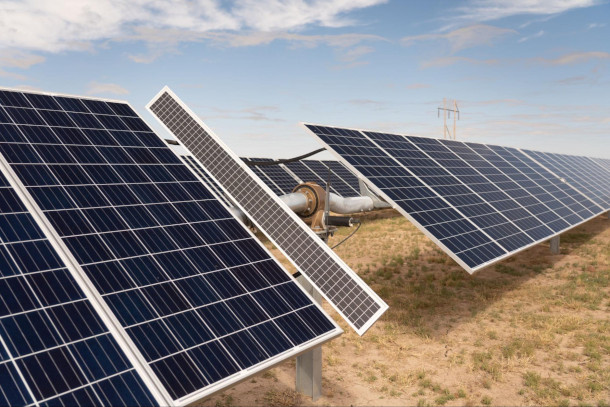
A new global climate finance goal is supposed to be negotiated by the end of COP29. Developing nations are pushing for a number in the trillions of dollars. (Photo: Jonathan Cutrer, Flickr, CC BY-NC 2.0)
BELTRAN: So, you mentioned that developing nations are hoping to reach a new global climate finance goal by the end of this COP. How much is needed to fill that gap, and to what extent is the world making a dent there?
MEYER: Well, there's pretty broad agreement on the overall need for developing countries that we need in the trillions of dollars, if we're going to address both decarbonizing their economies, converting to clean energy, dealing with deforestation, etc., if we're going to deal with adaptation investments and building resilience to the impacts of climate change, and that's not to mention what's called loss and damage, which is helping countries that are reeling from the current impacts of climate change. Trillions of dollars is not what's being discussed here by the developed countries. They are talking about much more modest increases over the existing 100 billion dollar a year goal. And of course, that's the big question, is, what will they come out of here next week with. It's complicated by the fact that the developed countries all insist that some of the wealthier developing countries, the Gulf states, like Saudi Arabia, the UAE, Singapore, South Korea, even China, participate in this next round of climate finance, and that they contribute as well. That is being actively resisted by the developing countries. They say that's renegotiating the agreement. And then, of course, there's also the question of what counts towards that number, whatever number they come up with. There starts to be controversy when you get into the area of private sector finance. And of course, there's a lot of concern with some countries about carbon markets, carbon offsets, that whole kind of area. And it's kind of strange that 30 years into this regime, we don't have agreement on what counts and doesn't count, but that's where we're at. You've got to remember that the original $100 billion commitment was not negotiated by countries. It was put on the table unilaterally by the US, UK, Europe, other developed countries in Copenhagen in 2009, and so this is the first time that we're actively having a negotiation over these issues in the treaty process.
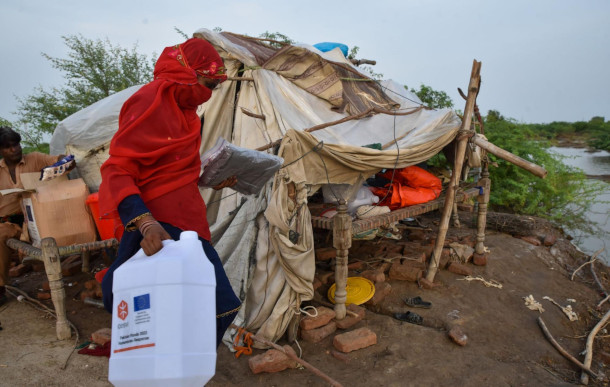
Floods in Pakistan in 2022 cost an estimated $30 billion in damage. Promises of $800 million for global loss and damage are negligible compared to the need of many developing nations experiencing the brunt of climate change effects. (Photo: EU Civil Protection and Humanitarian Aid, Flickr, CC BY 2.0)
BELTRAN: And Alden at last year's club, $700 million were pledged to assist developing countries with loss and damage. That was one major part of the global climate finance picture. As it stands now, who are the top contributors to loss and damage funds and who is maybe shortchanging those developing countries?
MEYER: Well, I mean, the leading contributors last year towards that $700 million, which now is, I think, a little over $800 million were the United Arab Emirates, which was the host of the COP, and Germany. They put in $100 million each. A number of other European countries put in money. The US was only able to come up with 17 and a half million dollars that they could mobilize from existing funds that Congress had already approved. That was seen as wildly inadequate. And of course, you've got to contrast that $800 million with the acknowledged need of tens or even hundreds of billions of dollars a year. For example, just before the COP last year that Pakistan was undergoing extreme flooding. The damages in that one country alone were estimated at $30 billion. So, $800 million, it was a good faith effort, but it's a drop in the bucket. And I also point out that you have to contrast that $800 million that was raised at COP28 last year for loss and damage with the three and a half billion dollars a day that countries are still spending to subsidize production and consumption of fossil fuels. That's kind of the definition of insanity. You're paying people to produce and burn something that you say is an existential threat to humanity, and yet we're doing over a trillion dollars a year going to subsidize fossil fuels.
BELTRAN: Alden, what other urgent topics of conversation are you hearing at this COP?
MEYER: Well, of course, everyone was talking about adaptation and impacts. We've seen, as you know, unprecedented devastation across the world this year, not just in the US, but the flooding that we've seen in Brazil, the recent flooding in Spain and in Colombia, drought and other regions. So this is really hitting home, and people are saying, we not only have to accelerate our efforts to reduce emissions of the heat trapping gasses that are driving this problem, but we have to cope with the rising impacts of climate change that are gonna continue to get worse over the next several decades, even if we're able to quickly wean ourselves off of fossil fuels. So that's getting a lot of attention here, driven by the reality of devastating climate impacts that most countries are now experiencing.
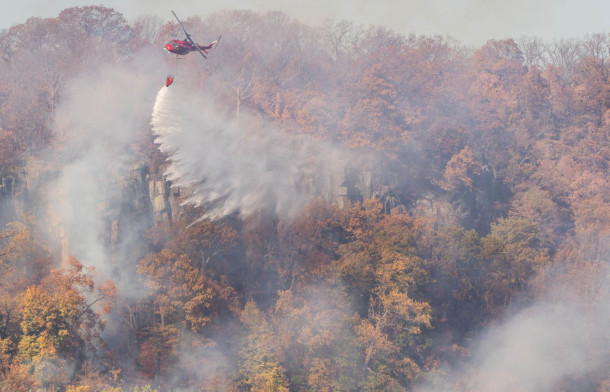
Wildfires erupted across the eastern US this fall as drought conditions persisted. Support for adaptation to climate change effects is another crucial topic of conversation at COP29. (Photo: Anthony Quintano, Flickr, CC BY 2.0)
BELTRAN: So, recent scientific reports warn that current national plans put us on track to warm the planet by around three degrees above pre-industrial levels. You know, that's far higher than the 1.5-degree goal. What can be done at this COP to get some actual movement towards that goal?
MEYER: Well, as you say, we're nowhere near on track to meet the 1.5 target. And of course, in 2018 the Intergovernmental Panel on Climate Change, which is the world's premier scientific body looking at this, said there was a tremendous difference in impacts between a 1.5-degree world and even a two-degree world. A three-degree world is horrific. I mean, it's really destabilizing and catastrophic, and everyone agrees that we need to do a lot more to close that gap. That's what we're looking for over the next months, into 2025 when it is time for countries to put their next round of commitments on the table under Paris. The current commitments go out to 2030. The next round are going out to 2035, and that will really determine whether or not we have a fighting chance to meet even the two degree target that countries set well below two degrees at Paris. And of course, we can already say that it's unlikely that this next round of commitments under Paris is going to be adequate. So, the host of the COP next year is Brazil, and they are going to have to grapple with, what do we do when what countries have put on the table doesn't add up, and they've got to insist this is not your final answer. You've got to go back and do more. You've got to ramp up sectoral ambition in areas like the power sector or deforestation or methane emissions or land use and agriculture. You have to work with your cities and your states and your companies and the other so called sub national actors to ramp up their ambition. So, there's gonna be a lot of work still to do after this next round of commitments. And I think the good news is Brazil understands that, and they're starting to lay the groundwork to, to make that happen next year, but this is a daunting prospect. We are basically trying to re-engineer the entire economic operating system of the planet in a matter of decades, which is unprecedented in human history. So, we shouldn't be surprised that it's not easy.
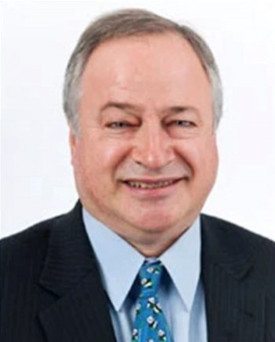
Alden Meyer is a Senior Associate at E3G working on US and international climate policy and politics. He is a Principal at Performance Partners, which provides a range of consulting services to clients in government, business, and the non-profit sector. (Photo: Courtesy of Alden Meyer)
BELTRAN: How crucial is it for progress to be made at COP29?
MEYER: Well, clearly, we need to make progress at every COP. I've said that over the years. This is a very important one in terms of finance, because it is the one where we decided we would try to agree on the post 2025 climate finance mobilization goal to replace the $100 billion. So that's important in two ways. It's important in terms of actually mobilizing greater sums of money to have an impact on the ground, but it's also important in terms of building confidence and trust in this process that it can deliver, that countries can work together across north, south lines, across regional differences, across all the conflicts that we're experiencing around the world, in the Middle East and Sudan and in Ukraine and other regions, and continue to cooperate on climate change, because we know when it comes to climate change, we're all in this together. We're all in the same boat. We can't afford to point fingers at each other and say, your end of the boat is sinking because we're all in the same boat.
BELTRAN: Alden Meyer is a senior associate of E3G, and he joined us from COP29 in Baku, Azerbaijan.
Links
Living on Earth wants to hear from you!
Living on Earth
62 Calef Highway, Suite 212
Lee, NH 03861
Telephone: 617-287-4121
E-mail: comments@loe.org
Newsletter [Click here]
Donate to Living on Earth!
Living on Earth is an independent media program and relies entirely on contributions from listeners and institutions supporting public service. Please donate now to preserve an independent environmental voice.
NewsletterLiving on Earth offers a weekly delivery of the show's rundown to your mailbox. Sign up for our newsletter today!
 Sailors For The Sea: Be the change you want to sea.
Sailors For The Sea: Be the change you want to sea.
 The Grantham Foundation for the Protection of the Environment: Committed to protecting and improving the health of the global environment.
The Grantham Foundation for the Protection of the Environment: Committed to protecting and improving the health of the global environment.
 Contribute to Living on Earth and receive, as our gift to you, an archival print of one of Mark Seth Lender's extraordinary wildlife photographs. Follow the link to see Mark's current collection of photographs.
Contribute to Living on Earth and receive, as our gift to you, an archival print of one of Mark Seth Lender's extraordinary wildlife photographs. Follow the link to see Mark's current collection of photographs.
 Buy a signed copy of Mark Seth Lender's book Smeagull the Seagull & support Living on Earth
Buy a signed copy of Mark Seth Lender's book Smeagull the Seagull & support Living on Earth

